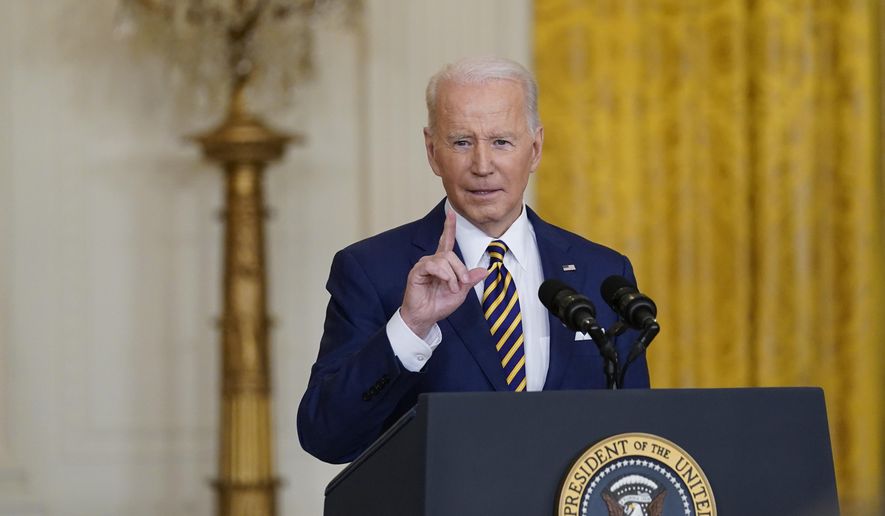Washington’s multitrillion-dollar spending habit has driven inflation across the U.S. higher than in most other Western democracies, according to the Federal Reserve Bank of San Francisco.
A report released on Wednesday by the bank said the U.S. inflation rate spiked higher than other countries in March 2021, shortly after Congress passed President Biden’s $1.9 trillion COVID-19 relief package.
“Fiscal support measures designed to counteract the severity of the pandemic’s economic effect may have contributed to this divergence by raising inflation about 3 percentage points by the end of 2021,” analysts wrote.
Economists argue that the current round of inflation that is wracking the economy results from the lingering effects of the coronavirus pandemic and the supply-chain crisis it spawned. They say COVID-19 shuttered businesses while driving up overhead costs through public health mandates for those that remained open.
As factories closed and international trade came to a halt, businesses still in operation were forced to hike prices even higher to account for the limited supply of goods and services, according to economists. Congress only boosted the demand for those goods and services by doling out trillions of dollars in coronavirus relief, including three direct payments to families worth upwards of $3,200.
Officially, the money was meant to stimulate an economy that was in free fall. Although that worked in theory, when coupled with the supply chain issues, the result was far different than desired.
“Both Democrats and Republicans have dangerously inflated prices by pumping trillions into the economy since the onset of the pandemic,” said David Ditch, a federal budget analyst at the Heritage Foundation. “They essentially created a situation where too much money was chasing too few goods.”
Although the coronavirus relief bills passed under then-President Trump helped fuel inflation, Mr. Biden’s $1.9 trillion exacerbated the situation by pouring more money into the economy just as it was starting to rebound from the pandemic, according to economists.
“Even liberal economists like the Obama White House’s Larry Summers warned that Biden’s big spending spree would set off inflation,” said Sen. Mike Braun, Indiana Republican.
The San Francisco Federal Reserve supports that view. The bank’s report notes that when not accounting for food and energy, inflation rose by 3% throughout 2021 — the highest rate since the 1980s. In comparison, countries like Canada, the United Kingdom and Germany saw a more gradual increase over the same time.
Democrats disagree that Mr. Biden’s massive coronavirus relief bill is the culprit. They say the supply chain crisis started long before Mr. Biden entered the White House and that other factors like corporate greed are at play.
“There is more to these price spikes — some businesses are simply price gouging consumers,” said House Energy and Commerce Committee Chairman Frank Pallone of New Jersey. “These outrageous actions have been constant throughout the pandemic, evolving with each phase and disproportionately harming the most vulnerable when they can least afford it.”
SEE ALSO: Biden to get fourth shot after COVID-19 speech
Mr. Biden hasn’t backed off from big-spending policies.
The White House is urging Congress to restart negotiations on the president’s defeated welfare and climate change package. Once known as the Build Back Better Act but now renamed Build Back America, the legislation would pump more than $1.75 trillion into the economy over the next decade.
Most of the money would be funneled into new programs that subsidize the cost of everything from electric car purchases to child-rearing. In the latter, Mr. Biden is proposing to reinstitute the expanded Child Tax Credit that sent $300 per month per child to parents making as much as $150,000.
Mr. Biden also has proposed a $5.8 trillion federal budget that includes 36 tax hikes.
• Haris Alic can be reached at halic@washingtontimes.com.




Please read our comment policy before commenting.